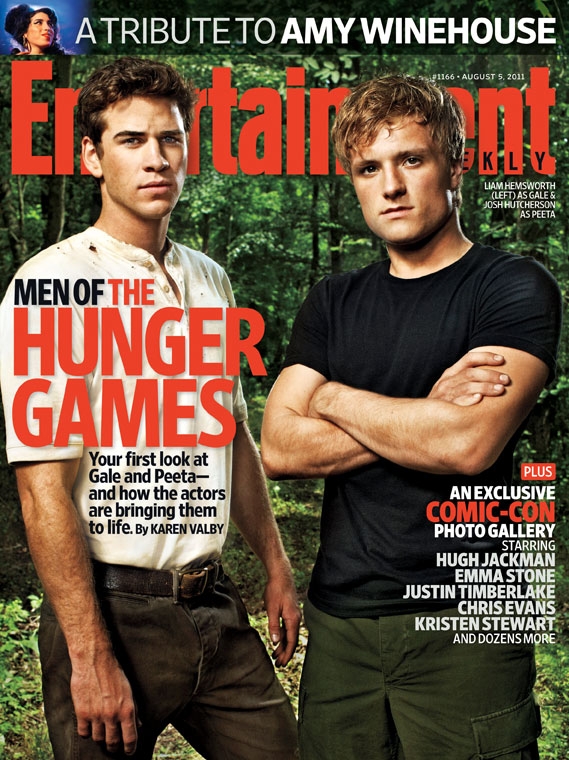Usually.
However, this made me pause. This is the first image of Gale and Peeta for the Hunger Games movie:

Is there anything there that makes you pause? Take another look if you don't see it.
I get really sad when Hollywood casts adult actors to play teenagers. For the most part, women who are cast to play teenage girls can usually pull it off. Of course they look mature, but the costuming and make-up departments work to make them look younger, and they do a good job In fact, I thought Katniss looked rather cute. But the boys? They don't look like teenagers. Rather, several aspects have been accented that actually make them look older, but were done because it also makes them look "sexier."
Notice the lovely arm hair and bulging muscles. Gotta love Peeta's nice, firm chest.
News flash: teenage boys don't look like that. Even those that play sports and go to the gym every day don't look like that. Being a teenager means coming with a bit of awkwardness and scrawniness from the childhood they're leaving behind. Also: can I add that both Peeta and Gale come from District 13? A very poor district? And though Gale had some training and went out into the woods, part of Peeta's charm was that he was an underfed baker's son. He was the underdog. That was why it was so much more awesome that he won.
But I'm not here to complain about the Hunger Games movie. I'm excited about it, and will definitely see it, despite my reservations about casting. I'm here to talk about body image with boys.
When we hear body image, we first think of girls. After all, they are a huge target for media. But do we ever stop to think about the damage that images above do for boys?
First of all, what does this image say to boys? This says that underfed, starving TEENAGE boys should look this hot. That to be considered attractive by girls, guys need to have the tight muscles and unruly hair. Oh, and of course, they can never smile. ;)
Both in movies and in some young adult fiction, boys have become nothing more than a prop for the main girl. Their feelings are disregarded, their body is buff and unrealistic, and their role revolves around the girl. They seem to have no personality outside of their feelings for the girl.
Normally I ignore movie posters with the buff boys. Living in North America, you grow accustomed to the way the media portrays certain things, even if you don't agree. But I worry for the Hunger Games movie, because it has a direct tie back to writers in the young adult section. This movie poster props Gale and Peeta up as eye candy, pieces of meat to be ogled. I read and enjoyed the Hunger Games, and Peeta and Gale were so much more than that. Their roles in the story have since been reduced to "Team Gale" and "Team Peeta" as if their characters have no other worth than who Katniss would choose to be with.
Writers, editors, readers, agents, we all want to see more boys reading young adult. Not just to appeal to more readers but so boys can have a chance to enjoy fiction that they can relate to as teenagers. But how can they relate to propped up card-board cut outs who's only value comes from their role in the romance?
Yes, the media is heavy to blame here, and I can't blame Suzanne Collins or her agent or her editor for the way Gale and Peeta are going to be portrayed. They have no control over it. But the problem with boys stretches into the books as well. (I'm not saying Hunger Games does this.) Often we see boys in young adult fiction who have been reduced to the lowest common denominator. The nerd. The best friend. The bad boy. The token gay guy. More and more boys are being shoved into categories while at the same time writers are taking girls out of those categories and making them more unique and rounded.
We've got a double standard here. When we see a boy who is juggling two girls, do we side on "teams" and root for the girl we want him to pick? No. He's just called a "cheater" or a "player." And yet when we have a girl who is in the same situation, juggling two guys and being COMPLETELY UNFAIR ABOUT IT, we expect the boys to wait patiently while the girl sorts out her feelings. How is this fair? More so, how do we expect to lure boys into young adult if the male characters' happiness is solely dependent on whether or not he's chosen as the girl's boyfriend?
Where are the boys like Etienne St. Clair, who has a life and problems outside of Anna? Where are the boys like Christian, who doesn't even notice Clara despite how much she threw herself at him? Where are the boys like Tucker, who won't put up with waiting around until Clara figures her things out?
Romance is great, but if your male characters are only around to prop up your female ones, you have some serious work to do. Boy readers will appreciate if you put the effort in, and so will girls. They want to know what's going inside their heads. Yes, girls enjoy seeing the cliched bad boy or best friend waiting in the wings for them, patient, nothing more than cardboard cut outs, but those are just guilty pleasures. If you move past that, your characters will be richer and your story will be so much better.
Peace,
-Katie



